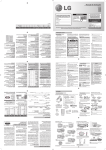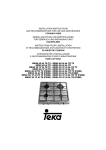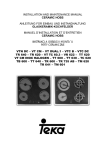Download LCD TV SERVICE MANUAL - Turuta Electronics World
Transcript
Internal Use Only North/Latin America Europe/Africa Asia/Oceania http://aic.lgservice.com http://eic.lgservice.com http://biz.lgservice.com LCD TV SERVICE MANUAL CHASSIS : LP91A MODEL : 26LH20R 26LH20R-MA CAUTION BEFORE SERVICING THE CHASSIS, READ THE SAFETY PRECAUTIONS IN THIS MANUAL. CONTENTS CONTENTS .............................................................................................. 2 PRODUCT SAFETY ..................................................................................3 SPECIFICATION ........................................................................................6 ADJUSTMENT INSTRUCTION................................................................11 TROUBLE SHOOTING ............................................................................16 BLOCK DIAGRAM...................................................................................19 EXPLODED VIEW .................................................................................. 20 SVC. SHEET ............................................................................................... Copyright LG Electronics. Inc. All right reserved. Only for training and service purposes -2- LGE Internal Use Only SAFETY PRECAUTIONS IMPORTANT SAFETY NOTICE Many electrical and mechanical parts in this chassis have special safety-related characteristics. These parts are identified by in the Schematic Diagram and Exploded View. It is essential that these special safety parts should be replaced with the same components as recommended in this manual to prevent Shock, Fire, or other Hazards. Do not modify the original design without permission of manufacturer. Leakage Current Hot Check (See below Figure) Plug the AC cord directly into the AC outlet. General Guidance An isolation Transformer should always be used during the servicing of a receiver whose chassis is not isolated from the AC power line. Use a transformer of adequate power rating as this protects the technician from accidents resulting in personal injury from electrical shocks. It will also protect the receiver and it's components from being damaged by accidental shorts of the circuitry that may be inadvertently introduced during the service operation. If any fuse (or Fusible Resistor) in this TV receiver is blown, replace it with the specified. When replacing a high wattage resistor (Oxide Metal Film Resistor, over 1W), keep the resistor 10mm away from PCB. Do not use a line Isolation Transformer during this check. Connect 1.5K/10watt resistor in parallel with a 0.15uF capacitor between a known good earth ground (Water Pipe, Conduit, etc.) and the exposed metallic parts. Measure the AC voltage across the resistor using AC voltmeter with 1000 ohms/volt or more sensitivity. Reverse plug the AC cord into the AC outlet and repeat AC voltage measurements for each exposed metallic part. Any voltage measured must not exceed 0.75 volt RMS which is corresponds to 0.5mA. In case any measurement is out of the limits specified, there is possibility of shock hazard and the set must be checked and repaired before it is returned to the customer. Leakage Current Hot Check circuit Keep wires away from high voltage or high temperature parts. AC Volt-meter Before returning the receiver to the customer, always perform an AC leakage current check on the exposed metallic parts of the cabinet, such as antennas, terminals, etc., to be sure the set is safe to operate without damage of electrical shock. To Instrument’s exposed METALLIC PARTS Leakage Current Cold Check(Antenna Cold Check) With the instrument AC plug removed from AC source, connect an electrical jumper across the two AC plug prongs. Place the AC switch in the on position, connect one lead of ohm-meter to the AC plug prongs tied together and touch other ohm-meter lead in turn to each exposed metallic parts such as antenna terminals, phone jacks, etc. If the exposed metallic part has a return path to the chassis, the measured resistance should be between 1MΩ and 5.2MΩ. When the exposed metal has no return path to the chassis the reading must be infinite. An other abnormality exists that must be corrected before the receiver is returned to the customer. Copyright LG Electronics. Inc. All right reserved. Only for training and service purposes -3- Good Earth Ground such as WATER PIPE, CONDUIT etc. 0.15uF 1.5 Kohm/10W When 25A is impressed between Earth and 2nd Ground for 1 second, Resistance must be less than 0.1 Ω *Base on Adjustment standard LGE Internal Use Only SERVICING PRECAUTIONS CAUTION: Before servicing receivers covered by this service manual and its supplements and addenda, read and follow the SAFETY PRECAUTIONS on page 3 of this publication. NOTE: If unforeseen circumstances create conflict between the following servicing precautions and any of the safety precautions on page 3 of this publication, always follow the safety precautions. Remember: Safety First. General Servicing Precautions 1. Always unplug the receiver AC power cord from the AC power source before; a. Removing or reinstalling any component, circuit board module or any other receiver assembly. b. Disconnecting or reconnecting any receiver electrical plug or other electrical connection. c. Connecting a test substitute in parallel with an electrolytic capacitor in the receiver. CAUTION: A wrong part substitution or incorrect polarity installation of electrolytic capacitors may result in an explosion hazard. 2. Test high voltage only by measuring it with an appropriate high voltage meter or other voltage measuring device (DVM, FETVOM, etc) equipped with a suitable high voltage probe. Do not test high voltage by "drawing an arc". 3. Do not spray chemicals on or near this receiver or any of its assemblies. 4. Unless specified otherwise in this service manual, clean electrical contacts only by applying the following mixture to the contacts with a pipe cleaner, cotton-tipped stick or comparable non-abrasive applicator; 10% (by volume) Acetone and 90% (by volume) isopropyl alcohol (90%-99% strength) CAUTION: This is a flammable mixture. Unless specified otherwise in this service manual, lubrication of contacts in not required. 5. Do not defeat any plug/socket B+ voltage interlocks with which receivers covered by this service manual might be equipped. 6. Do not apply AC power to this instrument and/or any of its electrical assemblies unless all solid-state device heat sinks are correctly installed. 7. Always connect the test receiver ground lead to the receiver chassis ground before connecting the test receiver positive lead. Always remove the test receiver ground lead last. 8. Use with this receiver only the test fixtures specified in this service manual. CAUTION: Do not connect the test fixture ground strap to any heat sink in this receiver. Electrostatically Sensitive (ES) Devices Some semiconductor (solid-state) devices can be damaged easily by static electricity. Such components commonly are called Electrostatically Sensitive (ES) Devices. Examples of typical ES devices are integrated circuits and some field-effect transistors and semiconductor "chip" components. The following techniques should be used to help reduce the incidence of component damage caused by static by static electricity. 1. Immediately before handling any semiconductor component or semiconductor-equipped assembly, drain off any electrostatic charge on your body by touching a known earth ground. Alternatively, obtain and wear a commercially available discharging wrist strap device, which should be removed to prevent potential shock reasons prior to applying power to the Copyright LG Electronics. Inc. All right reserved. Only for training and service purposes unit under test. 2. After removing an electrical assembly equipped with ES devices, place the assembly on a conductive surface such as aluminum foil, to prevent electrostatic charge buildup or exposure of the assembly. 3. Use only a grounded-tip soldering iron to solder or unsolder ES devices. 4. Use only an anti-static type solder removal device. Some solder removal devices not classified as "anti-static" can generate electrical charges sufficient to damage ES devices. 5. Do not use freon-propelled chemicals. These can generate electrical charges sufficient to damage ES devices. 6. Do not remove a replacement ES device from its protective package until immediately before you are ready to install it. (Most replacement ES devices are packaged with leads electrically shorted together by conductive foam, aluminum foil or comparable conductive material). 7. Immediately before removing the protective material from the leads of a replacement ES device, touch the protective material to the chassis or circuit assembly into which the device will be installed. CAUTION: Be sure no power is applied to the chassis or circuit, and observe all other safety precautions. 8. Minimize bodily motions when handling unpackaged replacement ES devices. (Otherwise harmless motion such as the brushing together of your clothes fabric or the lifting of your foot from a carpeted floor can generate static electricity sufficient to damage an ES device.) General Soldering Guidelines 1. Use a grounded-tip, low-wattage soldering iron and appropriate tip size and shape that will maintain tip temperature within the range or 500°F to 600°F. 2. Use an appropriate gauge of RMA resin-core solder composed of 60 parts tin/40 parts lead. 3. Keep the soldering iron tip clean and well tinned. 4. Thoroughly clean the surfaces to be soldered. Use a mall wirebristle (0.5 inch, or 1.25cm) brush with a metal handle. Do not use freon-propelled spray-on cleaners. 5. Use the following unsoldering technique a. Allow the soldering iron tip to reach normal temperature. (500°F to 600°F) b. Heat the component lead until the solder melts. c. Quickly draw the melted solder with an anti-static, suctiontype solder removal device or with solder braid. CAUTION: Work quickly to avoid overheating the circuit board printed foil. 6. Use the following soldering technique. a. Allow the soldering iron tip to reach a normal temperature (500°F to 600°F) b. First, hold the soldering iron tip and solder the strand against the component lead until the solder melts. c. Quickly move the soldering iron tip to the junction of the component lead and the printed circuit foil, and hold it there only until the solder flows onto and around both the component lead and the foil. CAUTION: Work quickly to avoid overheating the circuit board printed foil. d. Closely inspect the solder area and remove any excess or splashed solder with a small wire-bristle brush. -4- LGE Internal Use Only IC Remove/Replacement Some chassis circuit boards have slotted holes (oblong) through which the IC leads are inserted and then bent flat against the circuit foil. When holes are the slotted type, the following technique should be used to remove and replace the IC. When working with boards using the familiar round hole, use the standard technique as outlined in paragraphs 5 and 6 above. Removal 1. Desolder and straighten each IC lead in one operation by gently prying up on the lead with the soldering iron tip as the solder melts. 2. Draw away the melted solder with an anti-static suction-type solder removal device (or with solder braid) before removing the IC. Replacement 1. Carefully insert the replacement IC in the circuit board. 2. Carefully bend each IC lead against the circuit foil pad and solder it. 3. Clean the soldered areas with a small wire-bristle brush. (It is not necessary to reapply acrylic coating to the areas). "Small-Signal" Discrete Transistor Removal/Replacement 1. Remove the defective transistor by clipping its leads as close as possible to the component body. 2. Bend into a "U" shape the end of each of three leads remaining on the circuit board. 3. Bend into a "U" shape the replacement transistor leads. 4. Connect the replacement transistor leads to the corresponding leads extending from the circuit board and crimp the "U" with long nose pliers to insure metal to metal contact then solder each connection. Power Output, Transistor Device Removal/Replacement 1. Heat and remove all solder from around the transistor leads. 2. Remove the heat sink mounting screw (if so equipped). 3. Carefully remove the transistor from the heat sink of the circuit board. 4. Insert new transistor in the circuit board. 5. Solder each transistor lead, and clip off excess lead. 6. Replace heat sink. Circuit Board Foil Repair Excessive heat applied to the copper foil of any printed circuit board will weaken the adhesive that bonds the foil to the circuit board causing the foil to separate from or "lift-off" the board. The following guidelines and procedures should be followed whenever this condition is encountered. At IC Connections To repair a defective copper pattern at IC connections use the following procedure to install a jumper wire on the copper pattern side of the circuit board. (Use this technique only on IC connections). 1. Carefully remove the damaged copper pattern with a sharp knife. (Remove only as much copper as absolutely necessary). 2. carefully scratch away the solder resist and acrylic coating (if used) from the end of the remaining copper pattern. 3. Bend a small "U" in one end of a small gauge jumper wire and carefully crimp it around the IC pin. Solder the IC connection. 4. Route the jumper wire along the path of the out-away copper pattern and let it overlap the previously scraped end of the good copper pattern. Solder the overlapped area and clip off any excess jumper wire. At Other Connections Use the following technique to repair the defective copper pattern at connections other than IC Pins. This technique involves the installation of a jumper wire on the component side of the circuit board. 1. Remove the defective copper pattern with a sharp knife. Remove at least 1/4 inch of copper, to ensure that a hazardous condition will not exist if the jumper wire opens. 2. Trace along the copper pattern from both sides of the pattern break and locate the nearest component that is directly connected to the affected copper pattern. 3. Connect insulated 20-gauge jumper wire from the lead of the nearest component on one side of the pattern break to the lead of the nearest component on the other side. Carefully crimp and solder the connections. CAUTION: Be sure the insulated jumper wire is dressed so the it does not touch components or sharp edges. Diode Removal/Replacement 1. Remove defective diode by clipping its leads as close as possible to diode body. 2. Bend the two remaining leads perpendicular y to the circuit board. 3. Observing diode polarity, wrap each lead of the new diode around the corresponding lead on the circuit board. 4. Securely crimp each connection and solder it. 5. Inspect (on the circuit board copper side) the solder joints of the two "original" leads. If they are not shiny, reheat them and if necessary, apply additional solder. Fuse and Conventional Resistor Removal/Replacement 1. Clip each fuse or resistor lead at top of the circuit board hollow stake. 2. Securely crimp the leads of replacement component around notch at stake top. 3. Solder the connections. CAUTION: Maintain original spacing between the replaced component and adjacent components and the circuit board to prevent excessive component temperatures. Copyright LG Electronics. Inc. All right reserved. Only for training and service purposes -5- LGE Internal Use Only SPECIFICATION NOTE : Specifications and others are subject to change without notice for improvement. 1. Application range 3. Test method This spec sheet is applied to LCD TV used LP91A chassis. 1) Performance: LGE TV test method followed 2) Demanded other specification - Safety: CE, IEC specification - EMC : CE, IEC 2. Specification Each part is tested as below without special appointment. 1) Temperature : 25±5ºC (77±9ºF), CST : 40±5ºC 2) Relative Humidity : 65±10% 3) Power Voltage : Standard input voltage(100~240V@50/60Hz) * Standard Voltage of each products is marked by models. 4) Specification and performance of each parts are followed each drawing and specification by part number in accordance with BOM. 5) The receiver must be operated for about 5 minutes prior to the adjustment. 4. Electrical specification 4.1 General Specification No Item Specification 1 Screen Size 26” wide Color Display Module 2 Aspect Ratio 16:9 3 LCD Module 26” TFT WXGA LCD 4 Operating Environment Temp.: 0 ~ 40 deg Measurement Remark Resolution: 1366*768 HD Humidity : 0 ~ 80 % 5 Storage Environment Temp.: -20 ~ 60 deg Humidity : 0~ 85 % 6 7 Input Voltage LDC Module AC100-240V~, 50/60Hz ≤ 120 W 26” HD HD 626 x 373 x 44.1 (Maker : LGD) with inverter 0.1405 x 0.4215 12 EEFL Coating Copyright LG Electronics. Inc. All right reserved. Only for training and service purposes 3H -6- LGE Internal Use Only 5. Chroma& Brightness (Optical) 5.1. LCD Module the Color Coordinates check condition - 50cm from the surface, Full White Pattern - Picture mode Vivid No. Item 1. Luminance 2. VIew angle (R/L, U/D) 3. Color Coordinates Min. Typ. 360 450 Max. cd/m2 Unit 178/ 178 degree Maker Remark (W/O PC mode) White RED Green Blue 4. Contrast ratio 5. Luminance Variation Wx Typ 0.279 Typ Wy -0.03 0.292 +0.03 Xr 0.637 Yr 0.333 Xg 0.290 Yg 0.607 Xb 0.145 Yb 0.061 700:1 LGD CR > 10 LGD 26”(HD) LC260WXN-SBA1 1000:1 LGD 26”(HD) 1.3 8. Component Video Input (Y, PB, PR) Specification No Resolution Remark H-freq(kHz) V-freq(Hz) 59.94 Pixel Clock(MHz) 1 720* 480 15.73 13.500 SDTV, DVD 480I( 525I) 2 720* 480 15.75 60.00 13.514 SDTV, DVD 480I( 525I) 3 720* 576 15.625 50.00 13.500 SDTV, DVD 576I( 625I) 50Hz 4 720* 480 31.47 59.94 27.000 SDTV 480P 5 720* 480 31.50 60.00 27.027 SDTV 480P 6 720* 576 31.25 50.00 27.000 SDTV 576P 50Hz 7 1280* 720 44.96 59.94 74.176 HDTV 720P 8 1280* 720 45.00 60.00 74.250 HDTV 720P 9 1280* 720 37.50 50.00 74.25 HDTV 720P 50Hz 10 1920* 1080 28.125 50.00 74.250 HDTV 1080I 50Hz, 11 1920* 1080 33.72 59.94 74.176 HDTV 1080I 12 1920* 1080 33.75 60.00 74.25 HDTV 1080I 13 1920* 1080 56.25 50 148.5 HDTV 1080P 14 1920* 1080 67.432 59.94 148.350 HDTV 1080P 15 1920* 1080 67.5 60.00 148.5 HDTV 1080P Copyright LG Electronics. Inc. All right reserved. Only for training and service purposes -7- LGE Internal Use Only 9. RGB 9.1 Analog PC, RGB- DTV –NOT SUPPORT Specification No Resolution H-freq(kHz) Remark V-freq(Hz) Pixel Clock(MHz) 1 640* 350 31.468 70.09 25.17 EGA 2 720* 400 31.469 70.09 28.32 DOS 3 640* 480 31.469 59.94 25.17 VESA( VGA) 4 800* 600 37.879 60.317 40 VESA( SVGA) 5 1024* 768 48.363 60.004 65 VESA( XGA) 6 1280* 768 47.776 59.87 79.5 VESA( WXGA) 7 1360* 768 47.72 59.799 84.75 VESA( WXGA) 8 1280* 1024 63.668 59.895 109.00 XGA Only FHD Model 9 1920* 1080 66.587 59.934 138.50 WUXGA(Reduced Blanking) Only FHD Model 10. HDMI Input 10.1 PC –Spec. out but it can be shown the picture at only HDMI/ DVI IN 1 via DVI to HDMI Cable) No H-freq(kHz) V-freq.(Hz) Pixel clock(MHz) 640 x 480 31.469 59.94 25.17 VESA( VGA) 2 800 x 600 37.879 60.317 40.00 VESA( SVGA) 3 1024 x 768 48.363 60.004 65.00 VESA( XGA) 4 1280 x 768 47.776 59.87 79.5 VESA( WXGA) 5 1360 x 768 47.72 59.799 84.62 VESA( WXGA) 1 Resolution Proposed 6 1366 x 768 47.7 60.00 84.62 WXGA 7 1280 x 1024 63.595 60.00 108.875 SXGA 8 1920 x 1080 66.647 59.988 138.625 WUXGA Remark 10.2 DTV Mode Specification No Resolution H-freq(kHz) Remark V-freq(Hz) Pixel Clock(MHz) 1 720 x 480 15.73 59.94 13.500 SDTV, DVD 480I(525I) 2 720 x 480 15.75 60.00 13.514 SDTV, DVD 480I(525I) Spec. out 3 720 x 576 15.625 50.00 13.500 SDTV, DVD 576I(625I) 50Hz but display. 4 720 x 480 31.47 59.94 27 SDTV 480P 5 720 x 480 31.5 60.00 27.027 SDTV 480P 6 720 x 576 31.25 50.00 27 SDTV 576P 7 1280 x 720 44.96 59.94 74.176 HDTV 720P 8 1280 x 720 45 60.00 74.25 HDTV 720P 9 1280 x 720 37.5 50.00 74.25 HDTV 720P 10 1920 x 1080 28.125 50.00 74.25 HDTV 1080I 11 1920 x 1080 33.72 59.94 74.176 HDTV 1080I 12 1920 x 1080 33.75 60.00 74.25 HDTV 1080I 13 1920 x 1080 56.25 50.00 148.5 HDTV 1080P 14 1920 x 1080 67.432 59.94 148.350 HDTV 1080P 15 1920 x 1080 67.5 60.00 148.5 HDTV 1080P 16 1920 x 1080 27 24.00 74.25 HDTV 1080P 17 1920 x 1080 33.75 30.00 74.25 HDTV 1080P Copyright LG Electronics. Inc. All right reserved. Only for training and service purposes -8- LGE Internal Use Only 11. Mechical spec. No Item Min Typ Max Unit 1. C/ A + B/ C top gap 0.5 1 1.5 mm 2. C/ A + B/ C side gap 0.5 1 1.5 mm 3. C/ A + Deco Front gap( ONE SIDE). 0.8 1 1.2 mm 1) Gap between Front Frame /Back cover and Middle Cabinet 2) Gap between Front Frame /Middle Cabinet Top View Back Cover "b Middle Cabinet "b Front Frame Gap b between Front Frame (Back cover) and Middle Cabinet -> 0 † b † B (Side gap) "b Gap a between Front Frame and Middle Cabine -> 0 † a † A (Side gap) "a Gap a between Front Frame and Middle Cabine -> 0 † a † A (Left/ Right gap) 3) Gap between Back Cover and Side AV Side View Back View Side AV Back Cover Gap f between Back Cover and Side AV -> 0 † f † 1.0 Gap g between Back Cover and Side AV -> 0 † g † 1.0 Copyright LG Electronics. Inc. All right reserved. Only for training and service purposes -9- LGE Internal Use Only 4)Gap between Back Cover and Side AV Side View "h" Control Braket Back Cover Gap h between Back Cover and Control Bracket -> 0 † h † 0.8 *Active area 1. Active area of LCD PANEL is in bezel of cabinet 2. Interval between active area and bezel |A-B|< 2.0 mm ,|C-D|< 2.0 mm A:Interval between left of active area and bezel B:Interval between right of active area and bezel C:Interval between top of active area and bezel D:Interval between bottom of active area and beze C Active Area B A D Bezel Copyright LG Electronics. Inc. All right reserved. Only for training and service purposes - 10 - LGE Internal Use Only ADJUSTMENT INSTRUCTION 1. Application Range This specification sheet is applied to all of the LCD TV, LP91A/B/C/D chassis. (2) Download steps 1) Execute ‘ISP Tool’ program, the main window(Mstar ISP utility Vx.x.x) will be opened 2) Click the “Connect” button and confirm “Dialog Box” 2. Specification 1) Because this is not a hot chassis, it is not necessary to use an isolation transformer. However, the use of isolation transformer will help protect test instrument. 2) Adjustment must be done in the correct order. 3) The adjustment must be performed in the circumstance of 25 ±5 °C of temperature and 65±10% of relative humidity if there is no specific designation. 4) The input voltage of the receiver must keep 100~220V, 50/60Hz. 5) Before adjustment, execute Heat-Run for 5 minutes at RF no signal. 3. Adjustment items 3.1. PCB assembly adjustment items (1) Download the MSTAR main software (IC800, Mstar ISP Utility) 1) Using D/L Jig 2) Using USB Memory Stick. (2) ADC Calibration – RGB / Component (3) Input Tool-Option/Area option. (4) Check SW Version. 4. PCB assembly adjustment method 4.1. Mstar Main S/W program download 3) Click the “Config.” button and Change speed I2C Speed setting : 350Khz~400Khz 4.1.1. Using D/L Jig (1) Preliminary steps 1) Connect the download jig to D-sub(RGB) jack - LH20/ LH30 4) Read and write bin file. Click “(1)Read” tab, and then load download file(XXXX.bin) by clicking “Read”. 1 1 Filexxx.bin Filexxx. Copyright LG Electronics. Inc. All right reserved. Only for training and service purposes - 11 - LGE Internal Use Only 5) Click “(2)Auto” tab and set as below 6) Click “(3)Run”. 7) After downloading, you can see the “(4)Pass” message. 4.2. Adjust tool/area option. Adjust tool/area option refer to the BOM. 4.3. Adjust tool/area option. Adjust tool/area option refer to the BOM. 4.4. EDID D/L method Recommend that don’t connect HDMI and RGB(D-SUB) cable when downloading the EDID. If not possible, recommend that connect the MSPG equipment. There are two methods of downloading the edid data 4.1.2. Using the Memory Stick * USB download : Service Mode 1) Insert the USB memory stick to the ISB port. 2) Automatically detect the SW Version. -> S/W download process is executed automatically. 3) Show the message “Copy the file from the Memory” 4.4.1. 1st Method EDID datas are automatically downloaded when adjusting the Tool Option2. Automatically downloaded when pushing the enter key after adjusting the tool option2. It takes about 2seconds. 4.4.2. 2nd Method * Caution : Must be checked that the tool option is right or not. If tool option is wrong, hdmi edid data could not be downloaded well. 1) Press the ADJ key 2) Move to the EDID D/L and Press the right direction key(G) 3) Press the right direction key(G) at Start. 4) After about a few seconds, appear “OK”, then compele. 4) After Finished the Download, Automatically DC Off -> On 4.4.3. RS-232C command Method (1) Command : AE 00 10 * Caution Don’t connect HDMI and RGB(D-SUB) cable when downloading the EDID. If the cables are connected, Downloading of edid could be failed. 5) Check The update SW Version. Copyright LG Electronics. Inc. All right reserved. Only for training and service purposes - 12 - LGE Internal Use Only 4.4.4. EDID data (1) HD MODEL <Analog(RGB): 128bytes> 4.5. ADC Calibration 4.5.1. ADC Calibration - Component (Using External pattern) (1) Required Equipments - Remote controller for adjustment - MSPG-925F/MSPG-1025/MSPG-3233 Pattern Generator (2) Process 1) Change the Input to Component1 or 2 mode. 2) Input the Component 480i@60Hz 100% Color Bar YPbPr signal into Component1 or 2. (MSPG-925F Model: 209 / Pattern: 65 ) <HDMI 1 : 256Bytes> 3) Press ADJ key on R/C for adjustment. 4) Enter Password number. Password is “0 0 0 0”. 5) Select “0. ADC calibration : Component” by using D/E (CH +/-) and press ENTER(A). 6) ADC adjustment is executed automatically . 7) When ADC adjustment is finished, this OSD appear <HDMI 2 : 256Bytes> OK 4.5.2. ADC Calibration - RGB (Using External pattern) (1) Required Equipments - Remote controller for adjustment - MSPG-925F/MSPG-1025/MSPG-3233 Pattern Generator (2) Process 1) Change the Input to RGB mode.. 2) Input the PC 1024x768@60Hz Horizontal Color Bar signal into RGB. (MSPG-925F Model: 60 / Pattern: 65 ) 3) Press ADJ key on R/C for adjustment. 4) Enter Password number. Password is “0 0 0 0”. 5) Select “0. ADC calibration : RGB” by using D/E(CH +/-) and press ENTER(A). 6) ADC adjustment is executed automatically . 7) When ADC adjustment is finished, this OSD appear OK Copyright LG Electronics. Inc. All right reserved. Only for training and service purposes - 13 - LGE Internal Use Only 4.6. Input Tool-Option, Area Option. ## TOOL Option, Area Option change and AC off Before PCBA check, you have to change the Tool option, Area option and have to AC off/on (Plug out and in) (If missing this process, set can operate abnormally) 5.3. Connecting diagram of equipment for measuring (For automatic adjustment) 4.6.1. Profile : Must be changed the option value because being different with some setting value depend on module maker, inch and market 4.6.2. Equipment : adjustment remote control. 4.6.3. Adjustment method The input methods are same as other chassis.(Use IN-START Key on the Adjust Remocon.) (If not changed the option, the input menu can differ the model spec.) * Refer to Job Expression of each main chassis ass’y (EBTxxxxxxxx) for Option value * Never push the IN-STOP KEY after completing the function inspection. * LP91A~D Support RS-232C & I2C DDC Communication-White Balance Mode. (1) Enter the adjustment mode of DDC - Set command delay time : 50ms - Enter the DDC adjustment mode at the same time heatrun mode when pushing the power on by power only key - Maintain the DDC adjustment mode with same condition of Heat-run => Maintain after AC off/on in status of Heatrun pattern display) (2) Release the DDC adjustment mode - Release the adjust mode after AC off/on or std-by off/on in status of finishing the Hear-run mode - Release the Adjust mode when receiving the aging off command(F3 00 00) from adjustment equipment. - Need to transmit the aging off command to TV set after finishing the adjustment. - Check DDC adjust mode release by exit key and release DDC adjust mode) 4.7. Check SW Version (1) Method 1) Push In-star key on Adjust remote-controller. 2) SW Version check Check “SW VER : V3.xx” – LH20 (3) Enter the adjust mode of white balance) - Enter the white balance adjustment mode with aging command (F3, 00, FF) * Luminance min value is 150cd in the Cool/Medium/Warm mode(For LCD) 5.3. Adjustment of White Balance (for Manual adjustment) 5. White Balance adjstment 5.1. Overview (1) Purpose : Adjust the color temperature to reduce the deviation of the module color temperature. (2) Principle : To adjust the white balance without the saturation, Fix the one of R/G/B gain to 192 (default data) and decrease the others. (3) Adjustment mode : Three modes – Cool / Medium / Warm 5.2. Required Equipment (1) Remote controller for adjustment (2) Color Analyzer : CA100+ or CA-210 or same product LCD TV (ch:9) (should be used in the calibrated ch by CS-1000) (3) Auto W/B adjustment instrument(only for Auto adjustment) Copyright LG Electronics. Inc. All right reserved. Only for training and service purposes - 14 - (1) Color analyzer(CA100+, CA210) should be used in the calibrated ch by CS-1000 (2) Operate the zero-calibration of the CA100+ or CA-210, then stick sensor to the module when adjusting. (3) For manual adjustment, it is also possible by the following sequence. 1) Select white pattern of heat-run by pressing “POWER ON” key on remote control for adjustment then operate heat run longer than 15 minutes. (If not executed this step, the condition for W/B may be different.) 2) Push “Exit” key. 3) Change to the AV mode by remote control. 4) Input external pattern (85% white pattern) 5) Push the ADJ key -> Enter “0000” (Password) 6) Select “3. W/B ADJUST” 7) Enter the W/B ADJUST Mode 8) Stick the sensor to the center of the screen and select each items (Red/Green/Blue Gain and Offset) using D/E(CH +/-) key on R/C.. 9) Adjust R/ G/ B Gain using F/G(VOL +/-) key on R/C. 10) Adjust three modes all (Cool / Medium / Warm) : Fix the one of R/G/B gain and change the others 11) When adjustment is completed, Enter “COPY ALL”. 12) Exit adjustment mode using EXIT key on R/C. LGE Internal Use Only * CASE First adjust the coordinate far away from the target value(x, y). 1. x, y > target i) Decrease the R, G. 2. x, y < target i) First decrease the B gain, ii) Decrease the one of the others. 3. x > target, y < target i) First decrease B, so make y a little more than the target. ii) Adjust x value by decreasing the R 4. x < target, y > target i) First decrease B, so make x a little more than the target. ii) Adjust x value by decreasing the G (4) Standard color coordinate and temperature when using the CA100+ or CA210 equipment Coordinate Mode Cool x y 0.276±0.002 0.283±0.002 Temp uv∆ 11000K 0.000 Medium 0.285±0.002 0.293±0.002 9300K 0.000 Warm 0.313±0.002 0.329±0.002 6500K 0.003 To check the Coordinates of White Balance, you have to measure at the below conditions. Picture Mode : User 1 Dynamic Contrast : Off Dynamic Colour : Off (If you miss the upper condition, the coordinates of W/B can be lower than the spec.) Copyright LG Electronics. Inc. All right reserved. Only for training and service purposes - 15 - LGE Internal Use Only TROUBLESHOOTING No power (LED indicator off) : [A] PROCESS Fail Check 24V, 12V, 5,2V of Power B/D Check short of Main B/D or Change Power B/D Pass Fail Check Output of IC1001, IC1003, IC1007 Check short of IC1001, IC1003, IC1007 Fail Re-soldering or Change defect part of IC1001, IC1003, IC1007 Pass Pass Change IC1002,, Q1003 Fail Check LEDAssy Change LEDAssy Pass Check P307 Connector No Raster [B]: Process Pass Check LED status On Display Unit Fail Repeat A PROCESS Pass Check Panel Link Cable Or Module Fail Change Panel Link Cable Or Module Fail Change Inverter Connector Or Inverter Pass Check Inverter Connector Or Inverter Pass Check Output of IC802 Fail Change IC802 Pass Check LVDS Cable Fail Copyright LG Electronics. Inc. All right reserved. Only for training and service purposes Change Module - 16 - LGE Internal Use Only No Raster on PC Signal Pass Check Input source Cable and Jack Pass Check the Input/Output Of J104 Fail Re-soldering or Change the defect part Pass Check the Input/Output Of IC100 Fail Re-soldering or Change the defect part, Check RGB EDID Data Pass Check the Input/Output Of IC800 Fail Re-soldering or Change the defect part Pass Repeat [A], & [B] Process No Raster on HDMI Signal No Raster on COMMPONENT Signal Pass Pass Check Input source Cable And Jack Check Input source Cable And Jack Pass Pass Check The Input/Output Of JK101 Check the Input/Output Of JK301, JK302, JK303 Fail Re-soldering or Change the defect part Check the Input/Output Of IC800 Fail Re-soldering or Change the defect part Pass Check the Input/Output Of IC300, IC301, JK302 Pass Fail Re-soldering or Change the defect part Fail Re-soldering or Change the defect part Check HDMI EDID Data Re-download HDCP Pass Check the Input/Output Of IC800 Fail Re-soldering or Change the defect part Pass Repeat [A], & [B] Process Repeat [A], & [B] Process Copyright LG Electronics. Inc. All right reserved. Only for training and service purposes - 17 - LGE Internal Use Only No Raster On AV (Video, S-Video)Signal No Signal On TV(RF) Signal Pass Pass Check Input source Cable And Jack Check Input source Cable And Jack Pass Pass Check The Input/Output Of JK101, JK201 Fail Re-soldering or Change the defect part Check The Input/Output Of TU500 Fail Re-soldering or Change the defect part Pass Pass Check the Input/Output Of IC800 Fail Re-soldering or Change the defect part Check the Input/Output Of IC800 Pass Fail Re-soldering or Change the defect part Pass Repeat [A], & [B] Process Repeat [A], & [B] Process No Sound Check The Input Sourse. Fail Change The Source Input. Pass Check The Input/Output Of IC600. Fail Re-soldering or Change the defect part. Pass Check The Speaker. Fail Change Speaker. Pass Check The Speaker Wire. Copyright LG Electronics. Inc. All right reserved. Only for training and service purposes - 18 - LGE Internal Use Only RGB_PC EEPROM 24C02 PC_Aud io _L/ R :7 00m Vrms PC_R/ G/ B/ HS/ VS EEPROM 24C02 HDM 2_SCL/ SDA IR HDMI_DATA_1 HDMI_DATA_2 PC_SCL/ SDA PC_R/ G/ B/ HS/ VS COMP2_Y/ Pb / Pr: 1/0. 7Vp p MNT_OUT RIN COMP1_LIN/ COMP2_LIN/ RIN AV1_VIN: 1Vp p AV1 AV11_LIN/ RIN :5 00m Vrms - 19 - MNT_OUT: 1Vp p MNT_VOUT AV1_LIN/ RIN MNT_LOUT/ ROUT: 500m Vrm s TU_MAIN TUNER AUDIO AMP SUB_SCL / SDA SIF RS232 MAIN SCALER MNT_L/ R OUT TU_MAIN SIF 232C Driver ST3232C TXD / RXD :5V Dig it al USB Fo r D/ L OUT_E_TX_A OUT_E_TX_A– OUT_E_TX_B OUT_E_TX_B– OUT_E_TX_C OUT_E_TX_C– OUT_E_TX_CLK OUT_E_TX_CLK– OUT_E_TX_D – OUT_E_TX_ OUT_E_TX_E – OUT_E_TX_ OUT_O_TX_A– OUT_O_TX_A OUT_O_TX_B OUT_O_TX_B– OUT_O_TX_C OUT_O_TX_C– OUT_O_TX_CLK– OUT_O_TX_C OUT_O_TX_D OUT_O_TX_D– OUT_O_TX_E OUT_O_TX_E– USB_DN/ PN USB HDMI3 DDR2( 512MB) AV1_VIN MNT_OUT Tx/ Rx : – 15Vp p EEPROM( 256K) COMP1_Y/ Pb / Pr: 1/ 0. 7Vp p COMP2_Y/ Pb /Pr / : 1/ 0. 7Vp p Co mp 1_L/ R :5 00mVrms Co mp 2_L/ R :5 00mVrms TV ( RF) Serial Flas h ( 8MByt e) PC_Aud io _L/ R Pr : 1/ 0. 7Vp p COMP1_Y/ Pb / P COMP1 COMP2 TX HDMI1_SCL/ _ SDA TMDS EEPROM 24C02 HDMI3_SCL/ SDA HDMI_DATA_3 IIS_OUT LGE Internal Use Only AV2 ( Sid e AV) L VDS c onnec tor PC_Aud io EEPROM 24C02 TMDS TMDS BLOCK DIAGRAM Copyright LG Electronics. Inc. All right reserved. Only for training and service purposes HDMI1 HDMI2 SIDE_L/ SIDE_R :5 00mVrms SIDE_V : 1Vp p AV2_LIN/ RIN AV2_VIN PWM NTP3100L R_CH L_CH R_SPK_OUT L_SPK_OUT 510 803 EXPLODED VIEW IMPORTANT SAFETY NOTICE 805 310 500 801 550 900 LGE Internal Use Only LV1 540 530 200N 120 121 802 Many electrical and mechanical parts in this chassis have special safety-related characteristics. These parts are identified by in the Schematic Diagram and EXPLODED VIEW. It is essential that these special safety parts should be replaced with the same components as recommended in this manual to prevent X-RADIATION, Shock, Fire, or other Hazards. Do not modify the original design without permission of manufacturer. - 20 - A10 A2 800 200 200T 804 400 Copyright LG Electronics. Inc. All right reserved. Only for training and service purposes 300 R8028 4.7K C815 0.1uF EEP_SDA C819 10 10 R891 R892 10 10 PC_B PC_G +3.3V_MULTI_MST PC_R 390 0.1uF 0.1uF 0.1uF 0.047uF 1000pF 0.047uF 0.047uF 0.047uF R833 47 C827 0.047uF R836 47 C829 0.047uF R832 R834 R835 R837 R804 R815 R897 R802 47 47 470 47 47 47 47 47 C826 C828 C835 C830 C800 C801 C831 C832 0.047uF 0.047uF 1000pF 0.047uF 0.047uF 0.047uF 0.047uF 0.047uF COMP2_PR SIDE_C SIDE_Y CVBS_VIN SIDE_V EEP_SDA TV_MAIN +12V_AUDIO C810 R831 R857 R830 47 47 47 C834 C836 C837 0.047uF 0.047uF 0.047uF R875 R876 MAIN_SIF SIDE_LIN SIDE_RIN MNT_VOUT_T MNT_L_AMP MNT_R_AMP R810 68 R842 C839 R845 C841 0.01uF MULTI_PW_SW DDR2_A[6] DDR2_A[4] DDR2_A[2] DDR2_A[0] R867 1K DDR2_CASZ DDR2_RASZ DDR2_ODT DDR2_A[11] DDR2_A[8] DDR2_BA0 DDR2_BA1 DDR2_WEZ 0.1uF 0.1uF 1K C863 R868 AR800 56 AR815 56 AR814 56 AR813 56 56 AR812 56 R852 TXD RXD EEP_SCL EEP_SDA RL_ON I2S_SDO I2S_SCK KEY2 KEY1 TXD LED_R IR DSUB_SDA RXD C844 I2S_WS I2S_MCLK PANEL_STATUS DDR2_A[3] DDR2_A[7] DDR2_A[12] DDR2_A[9] DDR2_A[5] DDR2_A[10] DDR2_A[1] POWER_SW 0.1uF 100 R829 0 READY 0 READY 100 R8022 100 R8021 100 100 R8016 R8017 C883 AVDD_MEMPLL MVREF A_ODT A_RASZ A_CASZ A_MADR[0] A_MADR[2] A_MADR[4] GND_15 A_MADR[6] A_MADR[8] A_MADR[11] A_WEZ A_BADR[1] A_BADR[0] A_MADR[1] A_MADR[10] AVDD_DDR_6 A_MADR[5] A_MADR[9] A_MADR[12] A_MADR[7] A_MADR[3] A_MCLKE VDDC_6 I2S_IN_WS/GPIO67 I2S_IN_BCK/GPIO68 I2S_IN_SD I2S_OUT_MCK I2S_OUT_WS VDDP_5 GND_16 VDDC_7 I2S_OUT_BCK I2S_OUT_SD SPDIFO UART2_RX/I2CM_SDA UART2_TX/I2CM_SCK UART1_RX/GPIO86 UART1_TX/GPIO87 GND_17 GND_18 USB0_DM USB0_DP SAR0 SAR1 SAR2 SAR3 AVDD_MPLL XOUT XIN GPIO134 GPIO135 GPIO138 GPIO139 GPIO140 IRIN HSYNC0 VSYNC0 HSYNC1 VSYNC1 HWRESET GND_14 193 194 195 196 197 198 199 200 201 202 203 204 205 206 207 208 209 210 211 212 213 214 215 216 217 218 219 220 221 222 223 224 225 226 227 228 229 230 231 232 233 234 235 236 237 238 239 240 241 242 243 244 245 246 247 248 249 250 251 192 B_MCLKZ 2 191 B_MCLK 3 190 B_MDATA[5] 4 189 B_MDATA[2] 5 188 B_MDATA[0] 6 187 B_MDATA[7] 7 186 AVDD_DDR_5 AVDD_33_1 8 185 B_MDATA[13] RXB2N 9 RXBCKP RXB0N RXB0P HOTPLUGB RXB1N RXB1P RXB2P RXACKN RXACKP RXA0N RXA0P AVDD_33_2 RXA1N RXA1P GND_1 RXA2N RXA2P 1 184 B_MDATA[10] 10 183 GND_13 11 182 B_MDATA[8] 12 181 B_MDATA[15] 13 180 AVDD_DDR_4 14 179 B_DDR2_DQSB[1] 15 178 B_DDR2_DQS[1] 16 177 GND_12 17 176 VDDP_4 18 175 AVDD_DDR_3 19 174 B_DDR2_DQSB[0] 20 173 B_DDR2_DQS[0] 21 172 GND_11 22 171 B_DDR2_DQM[0] 23 IC800-*1 LGE3767A [MST99A88ML(MATRIX ONLY SD DIVX_ NON RM) ] HOTPLUGA REXT VCLAMP REFP REFM BIN1P SOGIN1 GIN1P RIN1P BINM BIN0P GINM GIN0P SOGIN0 RINM RIN0P AVDD_33_3 GND_2 BIN2P GIN2P SOGIN2 RIN2P CVBS6 CVBS5 CVBS4 CVBS3 CVBS2 CVBS1 VCOM1 CVBS0 VCOM0 AVDD_33_4 170 B_DDR2_DQM[1] 24 169 AVDD_DDR_2 25 168 B_MDATA[14] 26 167 B_MDATA[9] 27 166 GND_10 28 165 B_MDATA[12] 29 164 B_MDATA[11] 30 163 AVDD_DDR_1 31 162 B_MDATA[6] 32 161 B_MDATA[1] 33 160 GND_9 34 159 B_MDATA[3] 35 158 B_MDATA[4] 36 157 VDDC_5 37 156 VDDP_3 38 155 GPIO58 39 154 GPIO57 40 153 GPIO56 41 152 GPIO55 42 151 GPIO54 43 150 GPIO53 44 149 GPIO52 45 148 GPIO51 46 147 GND_8 47 146 GPIO152/I2C_OUT_SD3 48 145 GPIO151/I2C_OUT_SD2 49 144 GPIO150/I2C_OUT_MUTE 50 143 VDDC_4 51 142 GND_7 52 141 AVDD_LPLL 53 140 LVB0M 54 SIF0P 55 139 LVB0P 138 LVB1M 137 LVB1P 136 LVB2M 135 LVB2P 134 LVBCKM 133 LVBCKP 132 LVB3M 131 LVB3P 130 LVB4M 129 LVB4P CVBSOUT 125 126 127 128 124 LVA1P LVA0P LVA1M LVA0M VDDP_2 110 112 113 114 115 116 117 118 119 120 121 122 123 111 SCZ SDO PWM0 PWM1 PWM2 PWM3 LVA4P LVA3P LVA2P LVA4M LVA3M LVA2M LVACKP LVACKM 96 97 98 99 100 101 102 103 104 105 106 107 108 82 83 84 85 86 87 88 89 90 91 92 93 94 95 68 69 70 71 72 73 74 75 76 77 78 79 80 81 65 66 109 SDI SCK AUL2 AUL0 AUL3 56 57 58 59 60 61 62 63 64 AUL5 AUR5 AUVRM AUL4 SIF0M VDDC_1 AUOUTL2 AUOUTR2 67 GND_3 AUOUTL1 AUOUTR1 AUL1 LGE Internal Use Only [MODE SELECTION] THE SYMBOL MARK OF THIS SCHEMETIC DIAGRAM INCORPORATES SPECIAL FEATURES IMPORTANT FOR PROTECTION FROM X-RADIATION. FILRE AND ELECTRICAL SHOCK HAZARDS, WHEN SERVICING IF IS ESSENTIAL THAT ONLY MANUFATURES SPECFIED PARTS BE USED FOR THE CRITICAL COMPONENTS IN THE SYMBOL MARK OF THE SCHEMETIC. 252 256 RXBCKN 253 R884 1K READY 254 R883 1K R889 1K 255 R811 1K READY CEC +3.3V_MULTI_MST AUR1 +3.3V_MULTI_MST AUR2 RESET D803 KDS181 R864 AUR3 R887 33K SYS_RESET R863 4.7K AUR4 C812 4.7uF 100 HDMI_3 4.7K AUR0 +5VST_MST R888 C814 0.1uF +1.2V_VDDC_MST +3.3V_MULTI_MST Q803 RT1C3904-T112 2.2uF E 16V RXC0P 2 B TXCE4TXCE4+ TXCE3TXCE3+ TXCLKETXCLKE+ TXCE2TXCE2+ TXCE1TXCE1+ TXCE0TXCE0+ RXC1P R8000 10K 1K C8000 READY 0.1uF RXC2P 2K R853 SW800 JTP-1127WEM 3 1 Q800 ISA1530AC1 B E C R886 R855 10K C C842 TXCO4TXCO4+ TXCO3TXCO3+ TXCLKOTXCLKO+ TXCO2TXCO2+ TXCO1TXCO1+ TXCO0TXCO0+ GND_6 +5VST_MST POWER_DET +5VST_MST D802 KDS181 C870 47uF25V CVBS_LIN CVBS_RIN 150 1K 1K RL_ON C871 4.7uF 10V READY R885 100 100 100 100 22K +3.3V_MULTI_MST R893 4.7K 0.01uF GND_4 0 R8036 20K 19_22_26" R861 Q804 NON 19_22" RT1C3904-T112 R8037 C B R8007 33K E NON 19_22" 0 4 R860 2.2uF 2.2uF NON 19_22" R8001 D801 KDS181 C856 C861 R882 R881 R846 R847 GND R800 READY 0 0.1uF 0.1uF 1K OPC_EN C850 GND_5 P_24V_SMALL_15V P_12V_SMALL_15V 22K 0.01uF C868 C869 R8018 MUTE_LINE R865 4.7K SUB_SCL R866 4.7K SUB_SDA S_VIDEO_DET PANEL_ON R819 3.3K DISP_EN/VAVS_ON SW_RESET DDC_WP RXC0N 220 R807 402 READY 47 47 100 RXC1N R8041 C B E 47 Q802 RT1C3904-T112 1K RXC2N R808 MNT_VOUT MNT_VOUT_T R809 470 E C B Q801 ISA1530AC1 0.01uF 0.1uF R8042 GPIO20 GAIN X 4 C848 R8038 AUVRP R8006 22 0.1uF COMP2_PB COMP2_Y EEP_SCL DDR2_D[6] DDR2_D[1] DDR2_D[3] DDR2_D[4] AUVAG R8005 22 AR810 56 VDDP_1 SDA DDR2_D[14] DDR2_D[9] DDR2_D[12] DDR2_D[11] AUCOM 5 C838 SCL DDR2_DQM0 DDR2_DQM1 AR809 56 VDDC_3 4 WP DDR2_DQS0M DDR2_DQS0P VDDC_2 6 VCC MST99A88ML(MATRIX BASIC) 0.1uF RXCCKP 7 3 C865 0.01uF DDR2_DQS1M DDR2_DQS1P C849 RXCCKN 2 C862 0.01uF DDR2_D[13] DDR2_D[10] DDR2_D[8] DDR2_D[15] AR806 56 USB1_DP A2 8 C860 0.01uF 0.1uF USB1_DM A1 VSS R817 4.7K 1 IC800 C853 DDCA_CK A0 C858 0.01uF DDR2_D[0-15] DDR2_MCLKZ DDR2_MCLK DDR2_D[5] DDR2_D[2] DDR2_D[0] DDR2_D[7] DDCA_DA IC803 CAT24WC08W-T R8004 4.7K C879 0.01uF MSTAR R814 R803 R816 R818 R838 R840 C804 C805 C806 47 C843 470 C846 47 C845 47 C847 47 C825 0.1uF HWRESET 256 CEC 255 VSYNC1 254 HSYNC1 253 VSYNC0 252 HSYNC0 251 IRIN 250 GPIO140 249 GPIO139 248 GPIO138 247 GPIO135 246 GPIO134 245 XIN 244 XOUT 243 AVDD_MPLL 242 SAR3 241 SAR2 240 SAR1 239 SAR0 238 USB0_DP 237 USB0_DM 236 GND_18 235 GND_17 234 UART1_TX/GPIO87 233 UART1_RX/GPIO86 232 UART2_TX/I2CM_SCK 231 UART2_RX/I2CM_SDA 230 SPDIFO 229 I2S_OUT_SD 228 I2S_OUT_BCK 227 VDDC_7 226 GND_16 225 VDDP_5 224 I2S_OUT_WS 223 I2S_OUT_MCK 222 I2S_IN_SD 221 I2S_IN_BCK/GPIO68220 I2S_IN_WS/GPIO67219 VDDC_6 218 A_MCLKE 217 A_MADR[3] 216 A_MADR[7] 215 A_MADR[12] 214 A_MADR[9] 213 A_MADR[5] 212 AVDD_DDR_6 211 A_MADR[10] 210 A_MADR[1] 209 A_BADR[0] 208 A_BADR[1] 207 A_WEZ 206 A_MADR[11] 205 A_MADR[8] 204 A_MADR[6] 203 GND_15 202 A_MADR[4] 201 A_MADR[2] 200 A_MADR[0] 199 A_CASZ 198 A_RASZ 197 A_ODT 196 MVREF 195 AVDD_MEMPLL 194 GND_14 193 R880 R890 TMDS1_RX2TMDS1_RX2+ HPD_MST_1 C804/C805/C806:Close to IC as close as possible HDCP EEPROM C878 0.01uF AR805 56 AVDD_AU 22 TMDS1_RX1TMDS1_RX1+ 33 33 AVDD_DM R813 EEP_SCL 10 10 10 10 10 10 R843 R844 B_MCLKZ 192 B_MCLK 191 B_MDATA[5] 190 B_MDATA[2] 189 B_MDATA[0] 188 B_MDATA[7] 187 AVDD_DDR_5 186 B_MDATA[13] 185 B_MDATA[10] 184 GND_13 183 B_MDATA[8] 182 B_MDATA[15] 181 AVDD_DDR_4 180 B_DDR2_DQSB[1] 179 B_DDR2_DQS[1] 178 GND_12 177 VDDP_4 176 AVDD_DDR_3 175 B_DDR2_DQSB[0] 174 B_DDR2_DQS[0] 173 GND_11 172 B_DDR2_DQM[0] 171 B_DDR2_DQM[1] 170 AVDD_DDR_2 169 B_MDATA[14] 168 B_MDATA[9] 167 GND_10 166 B_MDATA[12] 165 B_MDATA[11] 164 AVDD_DDR_1 163 B_MDATA[6] 162 B_MDATA[1] 161 GND_9 160 B_MDATA[3] 159 B_MDATA[4] 158 VDDC_5 157 VDDP_3 156 GPIO58 155 GPIO57 154 GPIO56 153 GPIO55 152 GPIO54 151 GPIO53 150 GPIO52 149 GPIO51 148 GND_8 147 GPIO152/I2C_OUT_SD3 146 GPIO151/I2C_OUT_SD2 145 GPIO150/I2C_OUT_MUTE 144 VDDC_4 143 GND_7 142 AVDD_LPLL 141 LVB0M 140 LVB0P 139 LVB1M 138 LVB1P 137 LVB2M 136 LVB2P 135 LVBCKM 134 LVBCKP 133 LVB3M 132 LVB3P 131 LVB4M 130 LVB4P 129 UART2_TX R8027 4.7K 22 10 10 R869 R871 R872 R873 R874 R879 RXBCKN RXBCKP RXB0N RXB0P HOTPLUGB RXB1N RXB1P AVDD_33_1 RXB2N RXB2P RXACKN RXACKP RXA0N RXA0P AVDD_33_2 RXA1N RXA1P GND_1 RXA2N RXA2P HOTPLUGA REXT VCLAMP REFP REFM BIN1P SOGIN1 GIN1P RIN1P BINM BIN0P GINM GIN0P SOGIN0 RINM RIN0P AVDD_33_3 GND_2 BIN2P GIN2P SOGIN2 RIN2P CVBS6 S-VIDEO CVBS5 CVBS4 CVBS3 CVBS2 CVBS1 VCOM1 CVBS0 VCOM0 AVDD_33_4 CVBSOUT GND_3 SIF0P SIF0M VDDC_1 AUL5 AUR5 AUVRM AUOUTL2 AUOUTR2 AUOUTL1 AUOUTR1 UART2_RX SDA R812 R859 R862 TMDS2_RX2TMDS2_RX2+ TMDS1_RXCTMDS1_RXC+ TMDS1_RX0TMDS1_RX0+ 1 2 3 4 5 6 7 8 9 10 11 12 13 14 15 16 17 18 19 20 21 22 23 24 25 26 27 28 29 30 31 32 33 34 35 36 37 38 39 40 41 42 43 44 45 46 47 48 49 50 51 52 53 54 55 56 57 58 59 60 61 62 63 64 HOTPLUGC 5 SCL 10 10 10 10 DDCDB_CK 4 C803 0.01uF WP R851 R854 R856 R858 DDCDC_CK 6 VCC TMDS2_RXCTMDS2_RXC+ TMDS2_RX0TMDS2_RX0+ HPD_MST_2 TMDS2_RX1TMDS2_RX1+ DDCDC_DA 7 3 C864 0.01uF DDCDA_CK 2 C877 0.01uF +1.2V_VDDC_MST DDCDB_DA VSS 8 L802 120-ohm DDCDA_DA A2 0.1uF HDMI_1 A1 C833 +3.3V_MULTI_MST 1 C859 0.01uF +1.8V_DDR AUL0 AUR0 AUL1 AUR1 AUL2 AUR2 AUL3 AUR3 AUCOM AUL4 AUR4 GND_4 AUVRP AUVAG AVDD_AU GND_5 VDDC_2 DDCA_CK DDCA_DA DDCDA_CK DDCDA_DA DDCDB_CK DDCDB_DA GPIO20 VDDP_1 VDDC_3 UART2_RX UART2_TX DDCDC_CK RXCCKN RXCCKP DDCDC_DA RXC0N RXC0P GND_6 RXC1N RXC1P AVDD_DM RXC2N RXC2P HOTPLUGC USB1_DM USB1_DP SCK SDI SDO SCZ PWM0 PWM1 PWM2 PWM3 LVA4P LVA4M LVA3P LVA3M LVACKP LVACKM LVA2P LVA2M LVA1P LVA1M LVA0P LVA0M VDDP_2 HDMI_2 EEPROM A0 C857 0.01uF +3.3V_MULTI_MST 65 66 67 68 69 70 71 72 73 Close to IC 74 PC_AUD_L with width trace 75 PC_AUD_R C809 10uF 16V 76 C813 0.1uF 77 78 C818 1000pF 79 C820 4.7uF C840 0.01uF L801 80 120-ohm 81 82 R894 0 DSUB_SCL 83 R899 0 DSUB_SDA 84 R8023 100 DDC_SCL1 85 R8024 100 DDC_SDA1 86 R8025 100 DDC_SCL2 87 R8026 100 DDC_SDA2 READY 88 R8033 0 POWER_DET 89 C882 0.1uF 90 R806 0 91 M_SDA R870 0 92 M_SCL R8039 100 HDMI3_SIDE 93 DDC_SCL3 R801 10 HDMI3_SIDE 94 TMDS3_RXCHDMI3_SIDE 95 R805 10 TMDS3_RXC+ R8040 100HDMI3_SIDE 96 DDC_SDA3 R820 10 HDMI3_SIDE 97 TMDS3_RX0HDMI3_SIDE 98 R821 10 TMDS3_RX0+ 99 R822 10 HDMI3_SIDE 100 TMDS3_RX1R823 10 HDMI3_SIDE 101 TMDS3_RX1+ C876 0.01uF 102 R841 10 HDMI3_SIDE 103 TMDS3_RX2R848 10 HDMI3_SIDE 104 TMDS3_RX2+ 105 HPD_MST_3 106 R826 0 USB_DN 107 USB PART USB_DP R827 0 108 SPI_CLK 109 AR818 SPI_DI 33 110 SPI_DO 111 SPI_CZ 112 113 114 I-DIM 115 E-DIM 116 117 118 119 120 121 122 123 124 125 126 127 128 L800 120-ohm READY IC801 24LC256-I/SM C866 10uF DDC_WP 2.2uF 2.2uF 2.2uF 2.2uF 0.1uF 2.2uF 2.2uF 8 SO/SIO1 WP/ACC 9 SPI_DO C867 0.1uF R828 C B E 10K Q805 READY RT1C3904-T112 2.2uF 2.2uF R878 4.7K R824 R825 GND 10 X801 12MHz 7 CS C802 C873 C874 C875 C808 C821 C822 SPI_CZ R839 1M NC_5 11 C823 C824 R877 4.7K 100 100 NC_6 12 6 NC_4 +3.3V_MULTI_MST +3.3V_MULTI_MST +1.2V_VDDC_MST +1.8V_DDR +1.8V_DDR +3.3V_MULTI_MST 100 100 5 NC_3 SPI_DI R850 R8012 NC_7 13 R895 R849 NC_8 14 4 NC_2 Close to IC as close as possible I2S_OUT SYS_RESET CEC_C PC_VS PC_HS SI.SIO015 3 NC_1 SPI_CLK 0 0 2 VCC R8003 10K R8035 R8034 SCLK 16 +3.3V_MST C811 0.1uF COMP2_L COMP2_R 1 HOLD R8020 10K +3.3V_MST DDR2_CKE 4.7K R8010 4.7K R8011 +3.3V_MULTI_MST R896 4.7K R898 4.7K +3.3V_MULTI_MST Small_HD Small_HD Non_Small_FHD Small_FHD R898-*2 R8010-*3 R896-*2 R8011-*3 4.7K 4.7K 4.7K 4.7K 100Hz Non_Small_HD 100Hz Apollo DDR2_A[0-12] R8010-*2 R8011-*2 R898-*1 R896-*1 4.7K 4.7K 4.7K 4.7K Small_FHD Non_Small_FHDApollo Apollo R8010-*1 R8011-*1 4.7K 4.7K +5VST_MST Small_FHD Non_Small_HD R8011 X 4.7K 4.7K X 4.7K 4.7K ** Small HD : 19/22/26 Inch ** Non Small FHD : Normal(non 100Hz) FHD Model +3.3V_MULTI_MST C807 0.01uF R8010 4.7K 4.7K X 4.7K 4.7K X C816 20pF IC802 MX25L6405DMI-12G SERIAL FLASH 64M R898 X X X 4.7K 4.7K 4.7K C817 20pF R896 Small HD 4.7K Small FHD (27) 4.7K Non Small HD 4.7K Non Small FHD X Apollo X X 100HZ SCHEMATIC DIAGRAM Copyright LG Electronics. Inc. All right reserved. Only for training and service purposes *H/W OPTION DDR2_D[0-15] V_REF 1K R907 +1.8V_DDR 1K R908 Copyright LG Electronics. Inc. All right reserved. Only for training and service purposes DDR2_D[0-15] C904 C905 0 . 0 1 u F 1000pF C918 0.1uF 50V V_REF Close to DDR2 IC IC900 HYB18TC512160B2F-2.5 DDR2_A[0-12] VREF J2 A0 M8 A1 M3 A2 M7 A3 N2 A4 N8 A5 N3 A6 N7 A7 P2 A8 P8 A9 DDR2_A[10] P3 A10/AP DDR2_A[11] M2 A11 DDR2_A[12] P7 A12 R2 DDR2_A[0] DDR2_A[1] DDR2_A[2] DDR2_A[3] DDR2_A[4] DDR2_A[5] DDR2_A[6] DDR2_A[7] DDR2_A[8] DDR2_A[9] BA0 DDR2_BA0 BA1 DDR2_BA1 R906 150 DDR2_MCLK DDR2_MCLKZ DDR2_CKE READY DDR2_DQM0 DDR2_DQM1 56 L3 C2 DQ9 D7 DQ10 DDR2_D[10] D3 DQ11 DDR2_D[11] D1 DQ12 DDR2_D[12] D9 DQ13 DDR2_D[13] B1 DQ14 DDR2_D[14] B9 DQ15 DDR2_D[15] A1 VDD5 E1 VDD4 J9 VDD3 VDD2 VDD1 L8 A9 VDDQ10 K7 C1 VDDQ9 L7 C3 VDDQ8 WE K3 C7 VDDQ7 C9 VDDQ6 E9 VDDQ5 G1 VDDQ4 G3 VDDQ3 G7 VDDQ2 G9 VDDQ1 A3 VSS5 E3 VSS4 J3 VSS3 F7 B7 B3 R904 LDQS 56 E8 UDQS A8 NC4 L1 NC5 R3 NC6 R7 NC1 A2 NC2 E2 NC3 R8 VSSDL VDDL J7 J1 N1 VSS2 P9 VSS1 B2 VSSQ10 B8 VSSQ9 A7 VSSQ8 D2 VSSQ7 D8 VSSQ6 E7 VSSQ5 F2 VSSQ4 F8 VSSQ3 H2 VSSQ2 H8 VSSQ1 C919 10uF 10V DDR2 MEMORY LGE Internal Use Only THE SYMBOL MARK OF THIS SCHEMETIC DIAGRAM INCORPORATES SPECIAL FEATURES IMPORTANT FOR PROTECTION FROM X-RADIATION. FILRE AND ELECTRICAL SHOCK HAZARDS, WHEN SERVICING IF IS ESSENTIAL THAT ONLY MANUFATURES SPECFIED PARTS BE USED FOR THE CRITICAL COMPONENTS IN THE SYMBOL MARK OF THE SCHEMETIC. DDR2_D[8] DDR2_D[9] Close to DDR2 IC +1.8V_DDR C901 0.01uF C902 0.01uF C903 0.01uF C906 0.01uF C907 0.01uF C908 0.01uF C909 0.01uF C910 0.01uF C911 0.01uF C912 0.01uF C913 0.01uF C914 0.01uF C915 0.01uF C916 0.01uF C917 0.01uF K9 CAS UDQS DDR2_D[7] +1.8V_DDR R1 UDM C900 0.01uF 50V C8 DQ8 K2 56 +1.8V_DDR DDR2_D[6] F9 DQ7 CKE F3 R905 56 DDR2_D[5] F1 DQ6 M9 LDM DDR2_DQS0M DDR2_DQS1M DDR2_D[4] H9 DQ5 L2 R902 R903 56 DDR2_D[3] H1 DQ4 J8 LDQS R901 56 DDR2_D[2] H3 DQ3 DDR2 DDR2_DQS0P DDR2_DQS1P DDR2_D[1] DQ2 K8 CS R900 DDR2_D[0] DQ1 H7 CK RAS DDR2_RASZ DDR2_CASZ DDR2_WEZ DQ0 G2 CK ODT DDR2_ODT G8 +16V_NTP C1006 68uF 35V L1012 MLB-201209-0120P-N2 C1001 0.1uF 50V C1046 0.01uF P_12V_SMALL_15V +12V_AUDIO C1002 47uF 25V 120-ohm P1001 FM20020-24 5.2V 10 5.2V GND 11 12 GND 14 12V 12V GND 24V 4 13 16 15 17 18 GND C1008 0.01uF C1011 0.01uF IC1001 BD9130EFJ-E2 *ST 5V->3.3V GND ADJ 24V NC 19 20 Inverter ON A.Dim 21 22 Error Out NC 23 24 PWM Dim VCC +5V_MULTI ITH IC1007 AP2121N-3.3TRE1 25 26" C1003 10uF 16V GND 8 9 6 120-ohm Power ON 3 7 5.2V +5VST_MST VIN 3 2 MAX 300mA 1 C1004 10uF 16V VOUT C1053 0.01uF C1052 10uF16V GND C1017 10uF 16V +3.3V_MST C1034 1uF 25V READY R1008 12K GND 1 8 2 7 3 6 4 5 EN PVCC PGND MAX 2A C1012 560pF 50V NON 19_22" 2 Power ON GND 3 4 GND GND 5 6 GND 5.2V 7 8 5.2V 5.2V 9 10 5.2V GND 11 12 GND 12V 13 14 12V R1 INPUT 3 C1054 0.1uF R1013 0 2 OUTPUT OUT:3.3V C1028 100uF16V MAX 3A 1 15V AP1117EG-13 IN 3 MAX 1A 2 OUT C1015 0.1uF 50V 16 24V 17 18 24V NC 19 20 Inverter ON A.Dim 21 22 Error Out 24 PWM Dim GND P_24V_SMALL_15V GND 5V 5V R1 ADJ/GND NC A.Dim +1.8V_DDR 120-ohm C1022 C1023 0.1uF 10uF 50V 6.3V C1037 1uF 25V READY R1007 56 1% DDR2, Vref +1.8V NTP,AUDIO DSP 2 V0 = 1.25*(1+(R2/R1)) 3 4 5 6 **Switch 12V:P12V **Switch 5V:5V_MULTI -> 1.8V P_5V 7 10 P_12V_SMALL_15V L1006 L1005 120-ohm 120-ohm 19/22"(HD)/22"(FHD)/32"(Sharp) 26/27/32(LPL)/37/42/47/52" 8 R1049 33K C1027 68uF 35V READY Close to Q1003 Inverter_ON 9 PWM_Dim R1004 120 5% PANEL_ON Q1003 SI4925BDY EBK32753101 C1056 1uF25V R1065 33K NON 19_22" S1 R1065-*1 19_22" 10K C R1048 10K B Q1001 RT1C3904-T112 R1020 E 10K 11 P_5V 8 1 7 D1_1 S2 3 6 D2_2 G2 5 4 L1007 MLB-201209-0120P-N2 D1_2 G1 2 C1005 0.1uF 0LCML00003B R1050 2.2K +5V_+12V_LCD R1051 2.2K R1052 2.2K C1009 100uF16V C1010 0.01uF D2_1 +5V_MULTI C1019 C1021 10uF 16V 0.01uF C1048 1uF R1070 22K R1054 4.7K NON SHARP 32&52",AUO 25V R1053 C1043 0 0.47uF SHARP 52",AUO NON SHARP 52",AUO R1001 0 NON CMO 57" R1069 1.6K PANEL_STATUS POWER_SW R1068 10K C B +5V_MULTI R1064 0 R1040 0 CMO 57" R1041 0 CMO 57" R1039 0 CMO 32,42,47 R1042 0 R1043 0 NON CMO 32,42,47,57 R1002 10K C1045 2.2uF 16V R1044-*1 100 DC_DIM PWM_DIM *SHARP32":DC DIMMING +5V_MULTI R1005 1.2K R1046 3K 3 R1047 10K 1 2 Q1002 2SC3875S R1044 1K DC_DIM LED Block +5VST_MST Q1004 RT1C3904-T112 E R1014 0 CMO 32,42,47,57 R1059 10K NON 19_22" R1075 1K R1 OPC_OUT R1022 1K OPC_ENABLE R10450 CMO 32,42,47,57 **OPC_ENABLE : USE LGD Module C1044 2.2uF 16V 19_22" D1001 I-DIM L1008 CIC21J501NE P_12V_SMALL_15V R2 R1058 5.6K FB 1 C1032 560pF 50V MAX 3A C1030 10uF 25V C1031 10uF 25V 8 EN/SYNC GND2 7 SW_2 IN 3 6 SW_1 BS 4 C1025 0.1uF 16V C1038 1uF 25V READY +5V_USB R1018 2K NON 19_22" +5V_MULTI L1009 3.6uH 19_22" R1015 10 19_22" R1024 10 5 VCC C1035 1uF 25V 0 C1020 10uF 16V R1056 10 +5V_MULTI R1012 0 NON 19_22" C1000 10uF 16V C1024 0.1uF 50V READY S2A 50V R1011 LGE Internal Use Only THE SYMBOL MARK OF THIS SCHEMETIC DIAGRAM INCORPORATES SPECIAL FEATURES IMPORTANT FOR PROTECTION FROM X-RADIATION. FILRE AND ELECTRICAL SHOCK HAZARDS, WHEN SERVICING IF IS ESSENTIAL THAT ONLY MANUFATURES SPECFIED PARTS BE USED FOR THE CRITICAL COMPONENTS IN THE SYMBOL MARK OF THE SCHEMETIC. READY IC1006 MP2212DN R1057 30K L1010 MLB-201209-0120P-N2 +5V_TUNER OUT:5V +5V_MULTI C1026 100uF 16V E-DIM R1079 10K D1002 SAM2333 V0 = 0.8*(1+(R1/R2)) R1023 0 NON (CMO 32,42,47,57, SHARP 32") OPC_DISABLE R1076 1K OPC_ENABLE R1021 1K OPC_DISABLE **DC-DC CONVERTER 12V->5V_TUNER/USB DISP_EN/VAVS_ON C1029 0.1uF 50V C1033 0.1uF 50V Small(19_22") R1016 4.7K 3 R1017 10K 12 19_22" Q1005 2SC3875S 19_22" RL_ON POWER NC NON_19_22_26" L1013 MLB-201209-0120P-N2 OUT:1.85V 1 C1016 10uF 10V 1 +3.3V_MULTI_MST IC1002 ADJ/GND RL_ON 15V 15 23 OUT:1.27V +1.2V_VDDC_MST C1036 1uF 25V READY SMAW200-11 NON 19_22" P_12V_SMALL_15V GND NC R2 C1018 10uF 16VR1010 3.3K 1% R2 GND P_24V_SMALL_15V 0 P1002 3 R1003 10K 12 NON 19_22" Q1000 2SC3875S P_5V R1073 19_22" R1000 2.2K 1/4W 5% 1 R1074 0 NC 19_22" P_12V_SMALL_15V C1014 0 . 1 u FC1013 16V 10uF 16V IC1003 AZ1085S-3.3TR/E1 P_5V P_5V R1078 3.3 READY C1055 2200pF 50V READY V0 = 0.8*(1+(R2/R1)) P1000 FW20020-24S R1077 0 READY 10K R1006 L1002 2.2uH SW R1009 2K 2 1 5 5.2V **5V_MULTI->3.3V->1.2V +5VST_MST 1/10W 1/10W 1% NC GND GND C1007 0.01uF L1001 P_5V . Copyright LG Electronics. Inc. All right reserved. Only for training and service purposes L1000 CIC21J501NE EAM58113401 P_24V_SMALL_15V IC601 +1.8V HOTEL_OPT L606 Q600 RT1C3904-T112 +1.8V_AVDD 0LCML00003B L605 READY 120-ohm C642 10uF 35V C615 0.1uF R604 3.3 C617 0.1uF +1.8V_DVDD C619 390pF C621 390pF R610 R638 12 12 C632 0.47uF C669 0.1uF R623 4.7K MULTI_PW_SW MNT_L_AMP R614 5.6K R626 3.3 C671 0.01uF 0 R631 22KREADY R627 0 +3.3V_MULTI_MST +1.8V_AVDD VDR1B C622 0.1uF 1 42 NC 2 41 VDR2A 3 40 BST2A AD 4 39 PGND2A_2 DVSS_1 5 38 PGND2A_1 VSS_IO 6 37 OUT2A_2 36 OUT2A_1 35 PVDD2A_2 C605 C603 0.1uF 1000pF C601 100pF R600 3.3K +1.8V_AVDD C600 10uF 16V C602 0.1uF VDD_IO 8 IC600 NTP-3100L 34 PVDD2A_1 33 PVDD2B_2 32 PVDD2B_1 12 31 OUT2B_2 13 30 OUT2B_1 TEST0 14 29 PGND2B_2 DGND_PLL 9 AGND_PLL 10 LFM 11 AVDD_PLL DVDD_PLL NON_HOTEL_OPT HOTEL_OPT Main AMP 6 INPUT2- INPUT3- 9 MNT_ROUT 7 OUT2 B E R606 4.7K C624 1uF R622 6.8K R616-*12K C OUT3 8 R609 1K C628 6800pF C625 22000pF SPK_R+ R658 R653 12 12 C630 L607 390pF 2S DA-8580 2F +16V_NTP C634 390pF C626 0.1uF C629 0.1uF R621 12 C644 0.1uF C648 R628 0.01uF 4.7K R671 3.3 C673 1S 1F 0.47uF EAP38319001 R654 12 AUDI I2S_MCLK GND 11 5 INPUT2+ INPUT3+ 10 R615 5.6K R616 10K BST1A 7 4 VCC SPK_L- MNT_R_AMP RESET CLK_I 3 INPUT1+ INPUT4+ 12 C635 0.01uF SPK_L- C618 1uF VDR1A C608 R601 100 1uF C606 1000pF 2 INPUT1- INPUT4- 13 +12V_AUDIO R625 3.3 Q601 RT1C3904-T112 R624 READY C631 33pF C633 33pF BST1B PGND1B_1 1S 1F EAP38319001 R613 10K R618 6.8K 43 PGND1B_2 OUT1B_1 OUT1B_2 L603 2S DA-8580 2F NON_HOTEL_OPT SPK_L+ C672 0.01uF READY SW_RESET R607 1K R605 4.7K +12V_AUDIO 44 45 46 47 48 49 PVDD1A_1 PVDD1B_1 PVDD1A_2 OUT1A_1 OUT1A_2 PGND1A_1 PVDD1B_2 50 51 52 53 E Q603 RT1C3904-T112 54 PGND1A_2 R630 10K C 10KB R629 C616 22000pF 22000pF 55 C611 C637 R663 0.1uF 4.7K 1 OUT1 LM324DOUT4 14 C627 6800pF MNT_LOUT R608 R611 12 12 +3.3V_MST R613-*12K B E C612 330uF35V C613 0.01uF MLB-201209-0120P-N2 0LCML00003B C C620 0.1uF +16V_NTP 120-ohm MLB-201209-0120P-N2 56 Copyright LG Electronics. Inc. All right reserved. Only for training and service purposes AMP :GAIN X 4 +12V_AUDIO C643 0.1uF R667 4.7K R635 3.3 C647 0.01uF SPK_R- C614 1uF 100 100 R677 R678 R602 R603 100 100 R656 0 HOTEL_OPT 100 R676 C610 0.1uF R673 0 C651 1000pF 50V 28 PGND2B_1 27 BST2B 26 VDR2B 25 FAULT 23 22 24 MONITOR_2 MONITOR_1 MONITOR_0 +1.8V_DVDD C609 10uF16V 21 SCL 20 SDA 19 BCK 17 15 18 WCK DVDD SDATA C607 0.1uF 50V DVSS_2 C604 10uF 16V 16 +1.8V_DVDD C623 22000pF MULTI_PW_SW Chinese Hotel Option +16V_NTP SPK_R- 1 SPK_R+ 2 SPK_L- 3 SPK_L+ 4 THE SYMBOL MARK OF THIS SCHEMETIC DIAGRAM INCORPORATES SPECIAL FEATURES IMPORTANT FOR PROTECTION FROM X-RADIATION. FILRE AND ELECTRICAL SHOCK HAZARDS, WHEN SERVICING IF IS ESSENTIAL THAT ONLY MANUFATURES SPECFIED PARTS BE USED FOR THE CRITICAL COMPONENTS IN THE SYMBOL MARK OF THE SCHEMETIC. I2S_SDO I2S_WS I2S_SCK M_SDA M_SCL AMP_MUTE_HOTEL P600 SMAW250-04 C638 33pF 50V READY R620 0 C636 HOTEL_OPT 0.1uF HOTEL_OPT 2 3 AUDIO_R C639 33pF 50V READY P601 12505WR-09A00 HOTEL_OPT 1 +3.3V_MULTI_MST 4 HOTEL_OPT AMP_MUTE_HOTEL R612 200 B HOTEL_OPT R617 SW_RESET 10K HOTEL_OPT C Q602 RT1C3904-T112 HOTEL_OPT E R619 0 5 6 7 SPK_R+_HOTEL 8 SPK_R-_HOTEL 9 10 LGE Internal Use Only Copyright LG Electronics. Inc. All right reserved. Only for training and service purposes TU500-*1 TAFT-H203F TU500 TAFT-Z203D 1 1 NC_1 2 +5V_TUNER 2 GND_1 3 +B[5V] 4 NC_2 5 RF_AGC 3 Near the pin C501 0.01uF C508 10uF 16V C505 100uF16V C506 100uF16V 4 C509 100uF16V 5 L500 120-ohm 6 NTSC_TUNER READY 6 TP[3.3V_OPT] 7 NC_3 8 GND_2 L502 10uH READY 15 A-OUT 16 SIF-OUT 17 NC_6 18 NC_7 8 9 +5V_TUNER R504 47 M_SDA R505 47 M_SCL C502 27pF 10 L501 L501-*1 120-ohm C503 0.1uF 50V R506 220 R507 220 11 0 0 Ohm C504 READY 12 TV_MAIN 13 E B R502 4.7K 14 Q502 ISA1530AC1 C 15 C507 82pF READY 16 17 MAIN_SIF 18 19 19 NC_8 20 NC_9 21 SHIELD LGE Internal Use Only THE SYMBOL MARK OF THIS SCHEMETIC DIAGRAM INCORPORATES SPECIAL FEATURES IMPORTANT FOR PROTECTION FROM X-RADIATION. FILRE AND ELECTRICAL SHOCK HAZARDS, WHEN SERVICING IF IS ESSENTIAL THAT ONLY MANUFATURES SPECFIED PARTS BE USED FOR THE CRITICAL COMPONENTS IN THE SYMBOL MARK OF THE SCHEMETIC. 20 21 SHIELD GND_1 +B[5V] NC_2 RF_AGC TP[3.3V_OPT] NC_3 GND_2 SDA SCL MOPLL_AS NC_4 V-OUT NC_5 A-OUT SIF-OUT NC_6 NC_7 NC_8 NC_9 TUNER 9 SDA 10 PAL_TUNER SCL C500 27pF 11 MOPLL_AS 12 NC_4 13 V-OUT 14 NC_5 7 NC_1 SW_HPD : USE SW HPD (Default) MST_HPD : USE MST HPD +5V_MULTI +5V_MULTI +5V_HDMI_3 +5V_HDMI_2 IC301 CAT24C02WI-GT3 C R301 10K B E A0 A1 A2 22 VSS 1 8 2 7 3 4 6 5 R314 1K HPD_MST_3 Q302C 2SC3875S R312 10K IC302 CAT24C02WI-GT3 B E R327 100 SCL R304 100 SDA R305 100 R309 R311 10K 10K C301 0.01uF A0 A1 DDC_WP A2 JACK_GND 20 VSS 19 HPD 19 D302 KDS184S RT1C3904-T112 VCC WP A1 D301 KDS184S A2 +5V_HDMI_3 R303 1K RT1C3904-T112 A1 Q301 HPD_MST_2 A2 +5V_HDMI_2 C 2SC3875S C Copyright LG Electronics. Inc. All right reserved. Only for training and service purposes OPTION 1 8 2 7 3 4 6 5 VCC WP R329 100 SCL R317 100 SDA R318 100 R319 R320 10K 10K C300 0.01uF DDC_WP 18+5V_POWER 18 17DDC/CEC_GND 17 DDC_SDA2 DDC_SCL2 JP301 16 15 JP300 14 CEC TMDS2_RXCTMDS2_RXC+ TMDS2_RX0TMDS2_RX0+ TMDS2_RX1TMDS2_RX1+ TMDS2_RX2TMDS2_RX2+ 13 12 11 10 CLK+ 9 DATA08 DATA0_SHIELD 7 DATA0+ 6 DATA15 DATA1_SHIELD 4 DATA1+ 3 DATA22 DATA2_SHIELD 1 DATA2+ 20JACK_GND 16 SDA 15 SCL JP304 DDC_SDA3 DDC_SCL3 JP305 14 NC 13 CEC 12 CLK11 CLK_SHIELD 10 CLK+ 9 DATA08 DATA0_SHIELD 7 DATA0+ 6 DATA15 DATA1_SHIELD 4 DATA1+ 3 DATA22 DATA2_SHIELD 1 DATA2+ CEC TMDS3_RXCTMDS3_RXC+ TMDS3_RX0TMDS3_RX0+ TMDS3_RX1TMDS3_RX1+ TMDS3_RX2TMDS3_RX2+ . HDMI 21 KJA-ET-0-0032 JK303 JK302 QJ41193-CFEE1-7F +5V_MULTI +5V_HDMI_1 Q300C R300 10K IC300 CAT24C02WI-GT3 B +3.3V_MST A1 R302 1K D300 KDS184S C HPD_MST_1 A2 +5V_HDMI_1 RT1C3904-T112 E 2SC3875S A0 A1 A2 22 VSS 1 8 2 7 3 6 4 5 VCC WP R331 100 SCL R306 100 SDA R307 100 R308 R310 10K 10K C302 0.01uF DDC_WP 19 18 17 JP302 16 15 JP303 14 13 12 11 10 CLK+ 9 DATA08 DATA0_SHIELD 7 DATA0+ 6 DATA15 DATA1_SHIELD 4 DATA1+ 3 DATA22 DATA2_SHIELD 1 DATA2+ TMDS1_RX2+ 20JACK_GND 21 JK301 QJ41193-CFEE1-7F CEC TMDS1_RXCTMDS1_RXC+ TMDS1_RX0TMDS1_RX0+ TMDS1_RX1TMDS1_RX1+ TMDS1_RX2- . DDC_SDA1 DDC_SCL1 Q303 BSS83 CEC_READY D B S G R315 68K CEC_READY D303 MMBD301LT1G 30V CEC_READY R313 0 R316 56K CEC_READY CEC_C CEC D304 CDS3C30GTH 30V CEC_READY THE SYMBOL MARK OF THIS SCHEMETIC DIAGRAM INCORPORATES SPECIAL FEATURES IMPORTANT FOR PROTECTION FROM X-RADIATION. FILRE AND ELECTRICAL SHOCK HAZARDS, WHEN SERVICING IF IS ESSENTIAL THAT ONLY MANUFATURES SPECFIED PARTS BE USED FOR THE CRITICAL COMPONENTS IN THE SYMBOL MARK OF THE SCHEMETIC. LGE Internal Use Only JK100 PPJ226-01 9A [GN]1P_CAN 4A [GN]O-SPRING_A 3A [GN]CONTACT_A COMP2_Y ZD102 SD05 SD05 ZD103 R109 75 ZD101 SD05 R108 75 ZD100 SD05 R107 75 D101 30V R104 220K D100 30V R100 220K ZD104 SD05 R110 75 9B [BL]1P_CAN 8B [BL]C-LUG_A COMP2_PB 9C [RD]1P_CAN_1 8C [RD]C-LUG_A COMPONENT1 Copyright LG Electronics. Inc. All right reserved. Only for training and service purposes COMPONENT1, AV1, MNT_OUT[JACK PACK TYPE D] : JK100 COMP2_PR 9D [WH]1P_CAN 8D [WH]C-LUG_A_1 R114 9E[RD]1P_CAN_2 10K COMP2_L R118 12K 4E[RD]O-SPRING_A_1 3E [RD]CONTACT_A_1 9F [YL]2P_CAN R102 75 MNT_VOUT 5J 6J 10K COMP2_R R117 12K 4F [YL]O-SPRING_A 16V 100uF C102 C100 MUTE_LINE Q100 RT1C3904-T112 POP NOISE C103 100pF READY C B E R105 0 HOTEL_OPT R106 0 NON_HOTEL_OPT SPK_R+_HOTEL MNT_ROUT 16V 10uF C101 R101 0 HOTEL_OPT AUDIO_R MUTE_LINE POP NOISE 7K D102 30V NON_HOTEL_OPT 8G [WH]C-LUG_A_2 9H [RD]2P_CAN [RD]O-SPRING_B 5L 4H [RD]O-SPRING_A_2 [RD]CONTACT_B 6L 3H [RD]CONTACT_A_2 R115 10K D104 30V R111 220K D105 30V R112 220K R119 12K R116 10K CVBS_LIN CVBS_RIN R120 12K D103 30V NON_HOTEL_OPT C B Q101 RT1C3904-T112E S-VIDEO(China Model) S-VIDEO JK101 PSJ014-01 D107 30V C-LUG1 SIDE_C R122 75 S-VIDEO +3.3V_MULTI_MST 1 C-LUG2 R123 10K 2 GND 0-SPRING 6 S_VIDEO_DET 3 C-LUG3 4 5 7 C-LUG4 C104 OPT READY D106 30V SHIELD LGE Internal Use Only ZD106 SD05 ZD107 SD05 SIDE_Y R121 75 S-VIDEO THE SYMBOL MARK OF THIS SCHEMETIC DIAGRAM INCORPORATES SPECIAL FEATURES IMPORTANT FOR PROTECTION FROM X-RADIATION. FILRE AND ELECTRICAL SHOCK HAZARDS, WHEN SERVICING IF IS ESSENTIAL THAT ONLY MANUFATURES SPECFIED PARTS BE USED FOR THE CRITICAL COMPONENTS IN THE SYMBOL MARK OF THE SCHEMETIC. INPUT1 16V 10uF CVBS_VIN SD05 ZD105 AV1 [WH]C-LUG_B MNT_LOUT 3F [YL]CONTACT_A 9G [WH]2P_CAN R103 0 HOTEL_OPT SPK_R-_HOTEL MNT_OUT [YL]O-SPRING_B [YL]CONTACT_B R113 ADUC30S03010L_AMODIODE +5V_MULTI JK200 JK202 KCN-DS-1-0088 +3.3V_MST C204 0.1uF V+ C200 0.1uF 16 VCC C201 0.1uF C1- 3 14 T1OUT 13 R1IN C2- 5 12 6 11 T1IN 7 10 T2IN T2OUT R2IN 8 100 R204 4.7K C A AC C A AC ENKMC2837-T112 D212 PC_B ZD200 SD05 R208 68 ZD201 SD05 GND_1 10 C213 68pF R214 4.7K V_SYNC 14 5 RXD TXD R213 75 NC 4 D204 ADUC30S03010L_AMODIODE R207 68 BLUE 10 30V H_SYNC 13 9 9 R205 4.7K R212 75 BLUE_GND 4 +3.3V_MST 9 R2OUT PC_G GREEN 3 IR_OUT IR_OUT DSUB_SDA DDC_DATA 8 8 D201 ADUC30S03010L_AMODIODE 30V R1OUT R211 75 GREEN_GND 12 3 R203 PC_R RED 7 2 ENKMC2837-T112 D211 C GND_2 11 2 7 AC RED_GND 1 100 D200 ADUC30S03010L_AMODIODE 30V C2+ 4 VC202 0.1uF R202 15 GND 2 6 6 A 1 C1+ 1 C207 0.1uF 6630TGA004K IC200 ST3232CDR C203 0.1uF C206 0.1uF KCN-DS-1-0089 ENKMC2837-T112 D210 Copyright LG Electronics. Inc. All right reserved. Only for training and service purposes PC RS-232C (CI ITEM) R215 4.7K C211 68pF PC_HS PC_VS SYNC_GND 5 DSUB_SCL DDC_CLOCK 15 DDC_GND 16 ADUC30S03010L_AMODIODE 30V D209 SHILED SIDE AV JK201 4A [YL]O_SPRING 5A[YL]CONTACT JK203 PEJ024-01 SIDE_V 5.6B ZD202 3 R227 75 5.6B ZD203 6A 7A 3B[WH]C_LUG 10K R224 D206 30V SIDE_LIN R226 R223 220K 10K R225 D205 30V SIDE_RIN R228 12K R222 220K R237 0 Non_OCP +5V_USB OCP_READY 220uF C212 16V SIDE_USB Pin to Pin with EAN43439401 3 USB_DP USB_DL_P 2 1 D208 30V READY UB01123-4HHS-4F R201 0 D207 30V READY 4 It’s possibel to 27~47ohm R200 USB_DN USB_DL_N 0 5 REAR_USB 2 1 0 C AC REAR_USB JK205 C210 10uF6.3V 1A Design 3 KJA-UB-4-0004 0 R230 5 4 USB_DL_P USB DOWN STREAM USB_DL_N USB DOWN STREAM 100uF C214 16V ** R_SPRING 5 T_SPRING R235 12K PC_AUD_L R234 7B B_TERMINAL2 6B T_TERMINAL2 8 SHIELD_PLATE 2C[RD]U_CAN L201 500 4 R231 220K D203 30V CDS3C30GTH R232 220K R236 12K READY 5C[RD]CONTACT Close to SIDE_USB D202 30V CDS3C30GTH B_TERMINAL1 10K 4C[RD]O_SPRING JK204 R233 12K READY 2B[WH]U_CAN REAR_USB R229 PC_AUD_R T_TERMINAL1 10K 2A [YL]U_CAN USB E_SPRING IC202 OCP_READY MIC2009YM6-TR 6 VOUT OCP_READY R206 160 VIN 1 5 ILIMIT GND 2 4 FAULT/ ENABLE 3 R209 1K OCP_READY PC EDID +5VST_MST IC201 CAT24C02WI-GT3 A KDS226 D213 R238 510 OCP_READY L200 120OHM OCP_READY R210 4.7K OCP_READY C208 0.1uF OCP_READY A0 A1 C209 10uF OCP_READY A2 VSS 1 8 2 7 3 6 4 5 R219 4.7K VCC R220 4.7K R221 4.7K C205 0.01uF READY WP R216 100 SCL R217 100 SDA R218 100 DDC_WP DSUB_SCL DSUB_SDA LGE Internal Use Only THE SYMBOL MARK OF THIS SCHEMETIC DIAGRAM INCORPORATES SPECIAL FEATURES IMPORTANT FOR PROTECTION FROM X-RADIATION. FILRE AND ELECTRICAL SHOCK HAZARDS, WHEN SERVICING IF IS ESSENTIAL THAT ONLY MANUFATURES SPECFIED PARTS BE USED FOR THE CRITICAL COMPONENTS IN THE SYMBOL MARK OF THE SCHEMETIC. INPUT2 PC SOUND PPJ218-01 Copyright LG Electronics. Inc. All right reserved. Only for training and service purposes PANEL WAFER TXCE0+,TXCE0-,TXCE1+,TXCE1-,TXCE2+,TXCE2-,TXCE3+,TXCE3-,TXCE4+,TXCE4-,TXCLKE+,TXCLKE-,TXCLKO+,TXCLKO-,TXCO0+,TXCO0-,TXCO1+,TXCO 1-,TXCO2+,TXCO2-,TXCO3+,TXCO3-,TXCO4+,TXCO4- TF05-51S IR(Non 19/22/26) CONTROL KEY(Non 19/22/26) TXCE0+,TXCE0-,TXCE1+,TXCE1-,TXCE2+,TXCE2-,TXCE3+,TXCE3-,TXCE4+,TXCE4-,TXCLKE+,TXCLKE-,TXCLKO+,TXCLKO-,TXCO0+,TXCO0-,TXCO1+,TXCO 1-,TXCO2+,TXCO2-,TXCO3+,TXCO3-,TXCO4+,TXCO4- +5V_+12V_LCD P401 +5V_+12V_LCD +5V_+12V_LCD P402 P403 SMW200-28C FF10001-30 1 1 1 2 2 3 3 4 4 5 5 6 6 2 3 4 5 L411 500-ohm NON_19_22_26" L410 500-ohm NON_19_22_26" SUB_SCL HD(26/32/37/42/47") 7 SUB_SDA R420 4.7K NON_19_22_26" L403 120ohm +3.3V_MST 8 R421 4.7K KEY1 L406 120ohm C404 470pF C412 470pF KEY2 NON_19_22_26" C408 0.1uF NON_19_22_26" 9 10 10 12 13 C411 0.1uF NON 22/27" FHD R419 0 R422 0 NON 22/27" FHD +5VST_MST 3 4 5 6 C406 47uF 16V ZD402 8 9 11 12 TXCE4- 24 KEY2 FHD IR 5V_ST 25 26 27 +5VST_MST GND +5VST_MST WARM_ST(LED_R_BIG) ZD400 IR L402 120ohm C403 C407 47pF +3.3V_MULTI_MST 10 TXCE4+ 23 GND POWER_ON(LED_R_SMALL) 0.1uF READY +3.3V_MST R426 47K IR-OUT NON_19_22_26" NON_19_22_26" R417 0 L407 120-ohm ST_3.3V(LED_B) C414 R427 10K IR-OUT R400 B 0 R429 10K IR-OUT R428 10K IR-OUT B C 29 30 R430 22 IR-OUT IR_OUT 23 33 12 E Q405 2SC3052 IR-OUT TXCE1+ 15 16 TXCE2- 17 TXCE2+ 18 TXCE0TXCE0+ 19 TXCE1- 20 TXCE1+ 22 TXCE0- 23 TXCE0+ 24 25 25 R401 R402 R402 0 8 B I T o r 5 2 s h a r p10BIT(FHD)4.7K X 8BIT(HD) 8BIT(FHD) 52 sharp 32 sharp X X X X 0 0 0 X *8BIT(FHD):22/27" 26 +3.3V_MULTI_MST 26 27 27 28 29 28 R435 470 OPC_ENABLE 30 31 R405 READY 0 R411 1K OPC_EABLE C B OPC_EN OPC_ENABLE E Q400 RT1C3904-T112 OPC_ENABLE TXCLKO+ 35 OPC_OUTPUT TXCLKO- 36 37 38 OPC_OUT TXCO3+ R412 TXCO3- OPC_ENABLE 0 HD(19/22") E-DIM External VBR TXCO4+ 39 TXCO4- 40 . 14 TXCE1- 34 R403 13 TXCLKE+ 24 R401 4.7K 10BIT TXCO2+ TXCO2- 32 READY 0.1uFNON_19_22_26" 16V TXCO0+ TXCO0TXCO1+ TXCO1- 11 TXCLKE- 21 22 +3.3V_MULTI_MST 31 C Q404 E 2SC3052 IR-OUT 0 NON_19_22_26" 13 NON 22/27" FHD R425 0 R431 0 NON 22/27" FHD TXCE2+ 21 TXCE3- 22 KEY1 20 TXCE3+ 21 GND 19 TXCLKE- 20 28 7 18 10 TXCE3+ TXCE2- 17 TXCLKE+ 9 TXCE3- 41 42 43 44 45 46 +3.3V_MULTI_MST 47 48 IR(19/22/26") 19_22_26" P405 50 51 1 2 3 4 5 6 7 8 KEY1 R409 100 R407 4.7K JEIDA R424 0 VESA READY READY R413 0 52 KEY2 GND 5V_ST +3.3V_MULTI_MST GND IR LED_B LED_R 19_22_26" L408 BG1608B121F C405 100pF 50V 19_22_26" 9 . NON 22/27" FHD R423 0 49 19_22_26" L405 BG1608B121F C402 100pF 50V 19_22_26" R404 10K 19_22_26" R416 0 READY R410 10K 19_22_26" 19_22_26" C B Q401 E 2SC3052 CONTROL KEY (19/22/26") SUB_SCL +3.3V_MST R414 10K 19_22_26" 19_22_26" P404 +3.3V_MST SMAW200-03 19_22_26" L400 BG1608B121F R406 4.7K 19_22_26" C Q402 E 2SC3052 19_22_26" B LGE Internal Use Only R418 0 READY R415 10K 19_22_26" KEY1 KEY1 L401 BG1608B121F LED_R KEY2 KEY2 19_22_26" 19_22_26" C400 100pF 50V C401 GND 100pF19_22_26" 50V 1 2 3 THE SYMBOL MARK OF THIS SCHEMETIC DIAGRAM INCORPORATES SPECIAL FEATURES IMPORTANT FOR PROTECTION FROM X-RADIATION. FILRE AND ELECTRICAL SHOCK HAZARDS, WHEN SERVICING IF IS ESSENTIAL THAT ONLY MANUFATURES SPECFIED PARTS BE USED FOR THE CRITICAL COMPONENTS IN THE SYMBOL MARK OF THE SCHEMETIC. LVDS/ CTR KEY 2 16 TXCE2- 19 L404 120-ohm 8 TXCLKE+ 14 18 SCL ZD401 13 15 17 SDA 12 TXCE2+ 16 P400 12507WS-12L 7 TXCLKE- 11 15 NON_19_22_26" 1 TXCE0+ TXCE0TXCE1+ TXCE1- 14 NON_19_22_26" 6 TXCE3+ 8 9 11 NON_19_22_26" NON_19_22_26" 7 TXCE3- P/NO : MFL60021514 Feb., 2009 Printed in Korea



















































